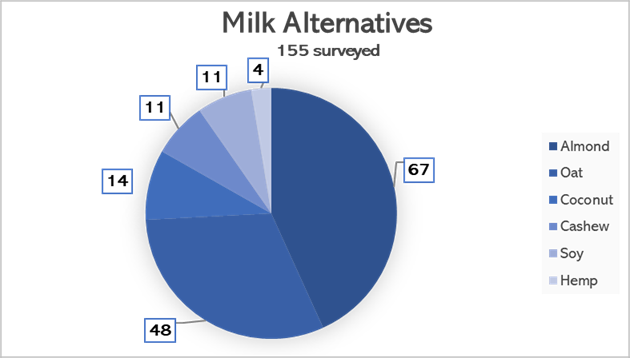Which milk substitute is best?
Milk alternatives are more common than ever, but which is tastiest and healthiest?
Whether in coffee, cereal, cookies, or just a glass, everyone uses milk, but not everyone uses cow’s milk. Now more than ever, people have opted for plant based “milks” in their everyday lives. These dairy free and vegan alternatives come from multiple plants and nuts and have many taste and health benefits.
In a survey of 236 people, only about 30% said that their go-to was cow’s milk. The remaining 155 people chose one of six alternatives. Let’s dive in.
Almond: With 67 votes, almond milk is the most popular alternative. This beverage made of ground almonds and water is a very common drink around the world. Its sweet, nutty flavor make it easy to drink and there’s no denying the benefits. Almond milk is a great source of antioxidants, vitamins, and minerals and is low in carbs and calories.
Oat: Coming in second place with 48 votes, oat milk is also a crowd favorite (and my favorite as well). Oat milk is a great alternative for those with allergies as it is free of many allergens found in other alternatives. It is sweet, creamy and much thicker than almond milk. Its creamy texture makes it a top pick for drinking, mixing, and blending. Sustainable, tasty, and high in nutrients, oat milk’s predicted to grow in popularity in the next few years.
Coconut: Coconut milk stole third with 14 advocates. This beverage is known for its classic coconut taste and adds a sweet, tropical twist to drinks and even food, it is very popular in Polynesian and Indian cooking. It comes thick or thin, sweet or bitter, depending on the brand, age of the coconut, and how it was made. Although higher in calories than some other alternatives, the benefits of coconut milk aid in both weight loss and heart health.
Cashew: With 11 votes, cashew milk comes in a tie for third. This alternative has a rich, creamy texture and a nutty finish. A good consistency to replace cow’s milk in most recipes, it also packs many vitamins and minerals. Cashew milk is especially good for eyes, skin, and the immune system.
Soy: Soy milk secured 11 votes as well, proving to have lost ground over the years. Soy milk has been around since the early parts of the 20th century as a common replacement for those who can’t consume dairy products. With a taste and texture resembling milk more than most other alternatives, it has been a common replacement for years, but the unique taste and health benefits of other plant milks have taken over the industry.
Hemp: The least popular of these beverages, hemp milk has 4 fans. Made from hemp seeds, this alternative is high in plant protein and has an earthy flavor. It has healthy fats, amino acids, and is a great option for those who are dairy, soy, nut, or gluten free.
These six plant and nut milks are just a few alternatives to traditional cow’s milk that can enrich your diet. Whether switching for dietary needs, taste, texture, or health benefits, all of these options are great choices.









